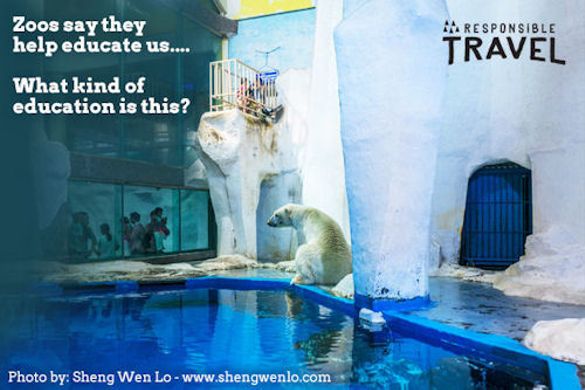 02 May 2017
02 May 2017
Tags: wildlife sanctuaries/Zoos, zoos, zoo, Responsible Travel, Animal Welfare, Wildlife, wildlife travel, ethical wildlife travel, animals in tourism, Survey, Justin Francis, eco travel, Ecotourism, Sustainable Tourism

Zoos spend over ten times less on conservation than visitors expect
An independent survey* of recent UK zoo visitors has shown that visitors overestimate zoos' spend on conservation by tenfold. Furthermore, almost 90% of visitors are concerned that many animals are adversely affected by being held captive.
The study, commissioned by Responsible Travel through Censuswide, asked 1000 people who have visited a zoo in the last five years about their understanding of the contributions these facilities make to wildlife conservation and education. The results show a huge disparity in public perceptions about zoos and the reality of their contribution to conservation – both in terms of economic input into conservation in the field, and in protecting endangered species.
Conservation commiseration
Many zoos market their conservation value with gusto. However, reality bites for 84% of UK zoo visitors who were surprised or very surprised to hear that zoos are encouraged to spend only 3%of their expenditure on conservation in the field[1], with respondents on average estimating figures that were over ten times that amount.
Furthermore, just 12% of respondents have carried out any form of conservation volunteering during the past 12 months, despite having visited a zoo in the last five years. It seems that visiting a zoo is not inspiring the British public to take action when it comes to conservation issues.
In fact half of the 16-24 year old surveyed said that watching wildlife-related TV programmes such as Planet Earth or films at the cinema would help inspire children to look after our world's wild animal populations. Just one quarter of that age group thought visiting a zoo would provide such inspiration.
Unhappy animals, means unhappy visitors
Almost 90% were concerned or very concerned to hear that behavioural studies have found that many animals are affected adversely by being held captive[3]. It seems that when presented with the reality of zoo life, visitors are as unhappy as many of the animals.
Endangered reality
61% of UK zoo visitors were surprised or very surprised to read that just 10% of animals in zoos are endangered [2]. When asked, over three-quarters of respondents estimated that at least one fifth or more of the animals kept in captivity by zoos would be endangered species.
Responsible Travel CEO Justin Francis said:
“What this survey shows is that zoos have been pulling the wool over the public's eyes when it comes to conservation claims. Visitors are leaving zoos with the message that their visit has contributed greatly to conservation projects and with endangered species. Very often this is simply not the case.
“It is our view that zoos have put themselves on a pedestal for too long and in reality most zoos are simply keeping animals in captivity for our entertainment, to continue their existence and to make money. They provide little of the conservation and education value they claim.
“We hope that more people will question their visit to a zoo and consider other ways, here in the UK or abroad, to support efforts to conserve wildlife in its natural environment”.
Earlier this month Responsible Travel became the first travel company to announce it was stopping promoting any holidays that visit a zoo, with support from the Born Free Foundation and keen animal welfare activist, actress Joanna Lumley. More details on the company's decision can be found in the blog post here: http://www.responsibletravel.com/zoos
*The survey was carried out by Censuswide between 12 April and 13 April 2017, by 1,000 people in the UK who have visited a zoo in the last five years or less.
References:
[1] (World Association of Zoos and Aquariums recommends members commit 3% of their annual operating budget (not inc donations) to conservation. http://www.waza.org/files/webcontent/1.public_site/5.conservation/conservation_strategies/committing_to_conservation/WAZA%20Conservation%20Strategy%202015_Portrait.pdf
BBC Horizon – Should We Close Our Zoos? 17th April 2016 - refers to zoos spending 3% on conservation.)
[2] (BBC Horizon – Should We Close Our Zoos? 17th April 2016) and (The EU Zoo Inquiry http://www.bornfree.org.uk/zooreports/Summary/ Born Free Foundation (2012), pp32 & 33.)
[3] http://www.bornfree.org.uk/campaigns/zoo-check/captive-wildlife-issues/abnormal-behaviours/
- Ends -
Notes to editors:
Interviews are available with Justin Francis, Responsible Travel CEO
Contact:
Sarah Faith or Krissy Roe
01273 829269
About Responsible Travel:
At Responsible Travel we help travellers live their dreams through authentic and life-enriching adventures, ensuring local people and wildlife benefit and being a catalyst for change in the industry.
Responsible Travel is now the world's largest platform for ethical tour providers (with a rigorous screening process in place to ensure each company fits the guidelines to be represented on the site). The company is growing by 22% each year with its profits dependent on an 'Honesty Box' where tour providers voluntarily declare their commission. It is a member ABTA.
- The holiday collection includes tours from almost 400 small, specialist and ethical tour operators
- The collective operates in 190+ countries
- In 15 years, the company has helped over 100,000 people live their travel dreams, received over 1million holiday enquiries and taken £100m in booking revenue.
Alongside the holidays it markets, Responsible Travel has three other core programmes to drive positive change in the tourism industry:
- Activism – campaigning for more responsible types of tourism worldwide.
- Trip for a Trip - Funding a day trip for a disadvantaged child in a developing country for every holiday booking (where the customer opts in).
- The World Responsible Tourism Awards (founded by us in 2004) - celebrating and recognising the businesses around the world, big or small, innovating and leading the way in responsible tourism.
CEO Justin Francis has been included in Courvoisiers The Future 500, Thames and Hudsons 60 Innovators Shaping Our Creative Future and taken his place on the Advisory Board of The International Centre for Responsible Tourism.

